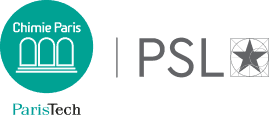Laboratory course in physical and analytical chemistry
Practical examination, bibliographic report, experimental reports, oral presentations, daily involvement
The laboratory classes are in accordance with the theoretical courses of electrochemistry, thermodynamics of solutions and separation sciences. The physico-chemical phenomena observed and mesured in laboratory classes are explained and modelized thanks to theoretical background acquired in formal courses. They also tend to illustrate industrial application fields.
A first group of experiments concerns the analysis of trace / ultratrace level compounds related to the domains of quality control, industrial processe monitoring and environmental protection: techniques such as liquid / liquid extraction of metallic cations (downstream of the nuclear fuel cycle); separation techniques (Ionic chromatography, high performance liquid chromatography, capillary electrophoresis) for the determination and quantitation of inorganic or organic pollutants; electrochemical methods (differential pulse polarography, ion-selective electrodes) for the identification and quantitation of pollutants in environmental matrices (water, soil) as well as for decontamination (ultrafiltration).
A second group of experiments focuses on the thermodynamics of interfaces to better understand the synthesis and characterization of new materials and processes using interfaces: electrochemical synthesis of materials (electrodeposition); corrosion study in presence or absence of inhibitors; electrokinetic characterization of membranes and application to electrodialysis (water purification); thermodynamics of surfaces (surface tension, water contact angle) to characterize functionalized surfaces (windshield design for example) and detergent formulations; characterization of complex media (hydrogen electrode, density meter, UV-visible spectrophotometry, cyclic voltammetry) to understand and predict phenomena in industrial processes using hydro-organic and micellar media, catalytic processes, etc.
Following this practical training, students should be able to:
– Follow health and safety guidelines
– Get pratical laboratory skills
– Fill out a laboratory workbook
– Analyse, exploit and discuss experimental data
– Use appropriate theoretical concepts and models
– Undertake a literature search
– Write experimental and bibliographic reports
– Present experimental results and conlusion to an audience
Teaching language: FR
Documents:
handouts, self evaluation quiz, tutorials
